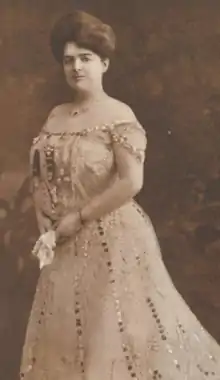Jessie MacLachlan
Jessie Niven MacLachlan (Scottish Gaelic: Seònaid NicLachlainn) (18 June 1866 – 13 May 1916) was a Scottish Gaelic soprano.
Jessie MacLachlan | |
|---|---|
 Jessie MacLachlan, from a postcard published in Australia, circa 1900; from the National Library of Australia | |
| Born | 18 June 1866 Oban, Scotland |
| Died | 13 May 1916 Glasgow, Scotland |
| Nationality | British |
| Other names | Seònaid NicLachlainn (Gaelic) |
| Occupation | Singer |
Early life
Jessie Niven MacLachlan was born at Oban, the eldest of eight children born to Alexander MacLachlan and Margaret Campbell Niven. Her father was an auctioneer.[1]
Career
MacLachlan achieved fame as a stage singer of Gaelic song.[2] She performed for Queen Victoria, at Balmoral Castle in 1892.[3] She toured extensively. She shared a bill with singer Harry Lauder and violinist Mackenzie Murdoch on a Scottish tour.[4] She toured in North America in 1901;[5] while in Canada, she sang with a teenaged Henry Burr, at the Opera House in Saint John.[6] In 1902 she sang at the Scottish Concert of the London Inverness-shire Association, to raise funds for Scottish scholarships and a "Home Club for Highland Lads" in London.[7] In 1905 she sang at a Burns Monument Fund benefit concert in Boston.[8] She performed in New Zealand in 1905 and again in 1907.[9][10]
During her North American tour MacLachlan was celebrated in newspapers and helped to increase the popularity of Gaelic song there.[11] "Whether it is crooning a Highland cradle song, or a call to the clans to take up arms, she is equally successful," observed one New Zealand reviewer in 1907, about her repertoire.[12]
In September 1899 MacLachlan made the first commercial gramophone recording of Gaelic song, performing "Oro Mo Nighean Donn Bhòidheach" ("Ho-ro my nut-brown maiden") to piano accompaniment.[13] She made further recordings in England in 1903.[14]
Personal life

Jessie MacLachlan married her accompanist, fellow musician Robert Buchanan, in 1887.[1] They had a son. She died in Glasgow in 1916, aged 49 years, shortly after making a "hazardous journey" from France during World War I.[1] Her grave is in Cathcart Cemetery.[15]
References
- Ewan, Elizabeth L.; Innes, Sue; Reynolds, Sian; Pipes, Rose (27 June 2007). Biographical Dictionary of Scottish Women. Edinburgh University Press. p. 233. ISBN 978-0-7486-2660-1.
- Maloney, Paul (13 September 2003). Scotland and the Music Hall, 1850-1914. Manchester University Press. p. 174. ISBN 978-0-7190-6147-9.
- "British". The Caledonian. 19: 104. June 1919.
- Lauder, Sir Harry (19 December 2019). Between You and Me. Good Press.
- "Plays and Players" Navy & Army Illustrated (21 November 1903): iii.
- "Henry Burr | Canadian Songwriters Hall of Fame Inductee". Canadian Songwriters Hall of Fame. Retrieved 19 March 2020.
- "Miss Jessie MacLachlan". The King of Illustrated Papers. 6: 796. 12 July 1902.
- "Burns Monument Fund". The Inter-Nation: 123. 23 February 1905.
- "Special Farewell Concert To-night!". Manawatu Standard. 21 November 1905. p. 1. Retrieved 1 December 2011.
- "Jessie MacLachlan, the Scottish Queen of Song". Oamaru Mail. 26 July 1907. p. 4. Retrieved 19 March 2020 – via Papers Past.
- Life in the City
- "Miss Jessie MacLachlan, The Distinguished Scottish Soprano". The Feilding Star. 2 September 1907. p. 2. Retrieved 19 March 2020 – via Papers Past.
- http://www.csis.ul.ie/naaclt2000/final_proceedings.htm. (Nilsen, K. Living Celtic Speech: Celtic Sound Archives in North America)
- Hoffmann, Frank; Cooper, B. Lee; Gracyk, Tim (12 November 2012). Popular American Recording Pioneers: 1895-1925. Routledge. p. 53. ISBN 978-1-136-59229-4.
- Tait, Derek (30 August 2016). Glasgow in the Great War. Pen and Sword. ISBN 978-1-4738-7316-2.
External links
- A postcard photograph of Jessie MacLachlan, from the National Library of Australia.
- An autographed souvenir photograph of Jessie MacLachlan, from the St. Marys Museum photo collection.
- Jessie MacLachlan in the British Academy of Music (BAM) Archives.